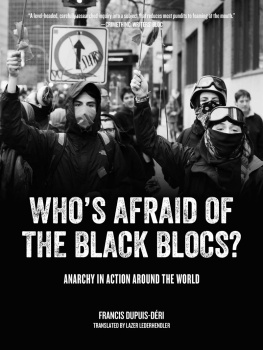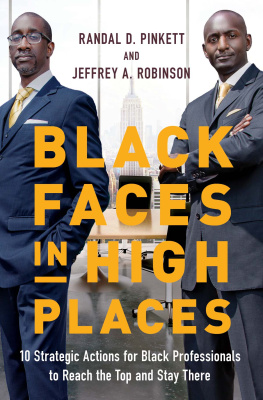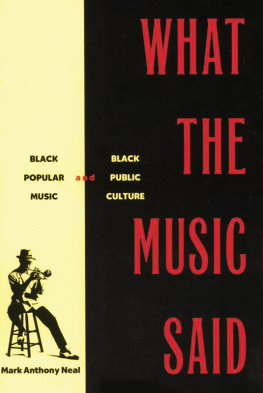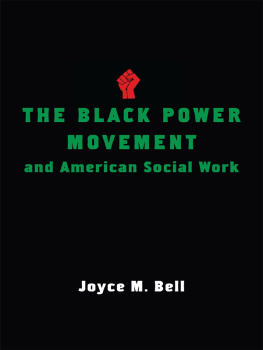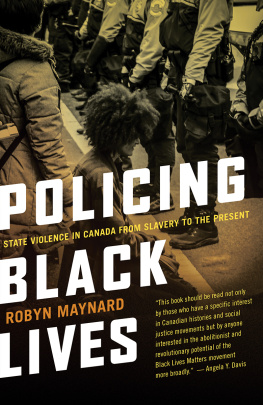Whos Afraid ofthe Black Blocs?
Wearing black to mask their identities, the Black Bloc fights injustice globally. Although little is known about these modern Zorros, this book critically reveals their origins and prospects. I heartily recommend it.
George Katsiaficas, activist and author of The Subversion of Politics
Dupuis-Dri cuts through the crap, taking the Black Bloc tactic seriously as both a political tool and a manifestation of the rage and joy that are part of the struggle for a better world.
Lesley J. Wood, Professor of Sociology, York University, and author of Direct Action, Deliberation, and Diffusion
The richness, imaginativeness, and sheer learning of Francis Dupuis-Dris work is stimulating and impressive. The whole book turns on a fascinating blend of the rigorously analytical and the generously imaginative. It was high time that it should be translated into English, as this well-established anarchist classic will both delight and inform.
Andrej Grubacic, Professor of Anthropology and Social Change, California Institute of Integral Studies, and co-author of Wobblies & Zapatistas
Whos Afraid of the Black Blocs? is a measured, critical, and persuasive defence of global protest actions. Against critics who dismiss these as purposeless or who treat illegalism as a distraction to the mainstream event, Dupuis-Dri highlights the effectiveness of the Black Blocs decision-making processes and the considered politics of its participants.
Ruth Kinna, Professor of Politics, History and International Relations, Loughborough University, UK and author of Anarchism: A Beginners Guide
Francis Dupuis-Dri provides the most sustained, energetic, and exciting discussion of the Black Blocs yet. No other work brings together the voices of participants and supporters, critics (from inside and outside of the movements), academics, and public commentators in such thorough analysis. His approach takes Black Blocs seriously but is in no way uncritical. This is essential reading for anyone concerned with contemporary political strategies and tactics. It will be urgently read by anyone seeking a glimpse of politics beyond the bland and rote repetition of conventional and familiar protest politics. Read it before your next demo.
Jeff Shantz, author of Commonist Tendencies
At last, a thorough historical and political explanation of property destruction as social protest.
Amory Starr, author of Naming the Enemy, Global Revolt, and Shutting down the Street
Francis Dupuis-Dri is one of the most important radical thinkers of his generation. This noteworthy translation of his groundbreaking analysis of the Black Blocs is a most welcome addition to scholarship. It is exemplary of his unwavering commitment to the serious study of emancipatory politics.
Martin Breaugh, Associate Professor of Political Science, York University and author of The Plebeian Experience
Whos Afraid of the Black Blocs? Anarchy in Action Around the World
By Francis Dupuis-Dri
Originally published in French as Les Black Blocs. La libert et lgalit se manifestent Lux diteur, Montral, 2007 www.luxediteur.com
English translation 2013 Lazer Lederhendler
This edition PM Press 2014
All rights reserved. No part of this book may be transmitted by any means without permission in writing from the publisher.
ISBN: 978-1-60486-949-1
Library of Congress Control Number: 2014908058
Cover design by John Yates
Front cover photo by Neal Rockwell
Layout by David Vereschagin/Quadrat Communications
PM Press
PO Box 23912
Oakland, CA 94623
www.pmpress.org
First published in English translation in 2013 by
Between the Lines
401 Richmond Street West, Studio 277
Toronto, Ontario M5V 3A8
Canada
www.btlbooks.com
10 9 8 7 6 5 4 3 2 1
Printed by the Employee Owners of Thomson-Shore in Dexter, Michigan. www.thomsonshore.com
CONTENTS
PREFACE
The French edition of this book first appeared in 2003 and was followed by two more in 2005 and 2007. This first English edition has been updated to take into account the events of the past decade. Over the years I have had the privilege of speaking with activists with a variety of opinions and personal histories. The conversations took place on four occasions: the Quebec student strike of 2012, the mobilization against the 2010 G20 Summit in Toronto (I was a member of CLAC, the Convergence des luttes anticapitalistes, based in Montreal), the one against the G8 meeting in vian in 2003, and the protests against the Summit of the Americas in Quebec City in 2001. During those events I was also able to meet with close observers of the movement, including Clment Barrette, who in 2002 authored a study titled La pratique de la violence politique par lmeute: le cas de la violence exerce lors des contre-sommets (The practice of political violence through rioting: the case of the counter-summits). Following the publication of the second edition of Les blacks blocs by the Atelier de cration libertaire in Lyon in the spring of 2005, a number of collectives in a dozen cities in France and Switzerland generously invited me to discuss the Black Blocs phenomenon. At the information booths set up at these meetings I was able to stock up on pamphlets dealing with marches and direct action. This literature and the lively debates in which I took part prompted me to include in this edition additional statements by demonstrators who had participated in Black Blocs. I was also able to integrate (thanks to translation assistance from Davide Pulizzotto) information drawn from Black Blocs, a book published in Italian in 2011. I would like to thank the photographers for their permission to use their work. I would also like to thank Amanda Crocker, Marie-ve Lamy, Lazer Lederhendler, and Matthew Kudelka for their alert readings and comments. Finally, apologies are in order for any overlap between this book and three previously published articles of mine: The Black Blocs Ten Years After Seattle, Journal for the Study of Radicalism 4, no. 2 (2010); Penser laction directe des Black Blocs, Politix 17, no. 68 (December 2004); and Black Blocs: bas les masques, Mouvements 25 (January-February 2003).
I NTRODUCTION
never seen except when feared
Dont forget: they hit the streets
Lo Ferr, Les anarchistes
The Black Blocs are todays best political philosophers.
Nicolas Tavaglione
One day, history will vindicate us.
Black Bloc participant, Toronto, June 2010
Amid clouds of tear gas, police officers in full riot gear face off with silhouetted figures bustling in the street. Masked and dressed in black, those figures are the Black Bloc. The black flag of anarchism waves above the commotion as bottles, rocks, and even the occasional Molotov cocktail fly overhead. The police fire volleys of tear gas and rubber bullets. Sometimes the bullets are real. The action unfolds against a backdrop of banks and multinational retail shops smeared with anarchist and anti-capitalist graffiti, their windows shattered. Since the epic Battle of Seattle, fought on November 30, 1999, during the meeting of the World Trade Organization (WTO), the media have enthusiastically captured such scenes.
According to a widespread myth, there is only one Black Bloc, which is thought to be a single permanent organization with numerous branches throughout the world. In fact, the term Black Bloc represents a shifting, ephemeral reality. Black Blocs are composed of ad hoc assemblages of individuals or affinity groups that last for the duration of a march or rally. The expression designates a specific type of collective action, a tactic that consists in forming a mobile bloc in which all individuals retain their anonymity thanks in part to their masks and head-to-toe black clothing. Black Blocs may occasionally use force to express their outlook in a demonstration, but more often than not they are content to march peacefully. The primary objective of a Black Bloc is to embody within the demonstration a radical critique of the economic and political system. Metaphorically speaking, it is a huge black flag made up of living bodies, flying in the heart of a demonstration. As one activist put it, the Black Bloc is our banner. To make their message more explicit, Black Blocs generally display a number of anarchist flags (black or red and black) and banners bearing anti-capitalist and anti-authoritarian slogans.
Next page
